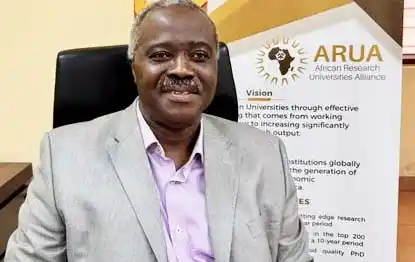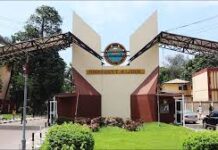Professor John Owusu Gyapong on his first day at the office as new secretary-general of ARUA, Image: XThe African Research Universities Alliance (ARUA) has moved a step closer to realising its ambition of boosting the production of doctoral graduates in Africa with the announcement that its executive committee has approved 16 new collaborative PhD programmes set to launch in January 2026.
The new PhD programmes, expected to be funded by the Mastercard Foundation, are a direct response to the pressing need to bolster research capacity in Africa. The initiative represents a significant investment in Africa’s future research leaders and is designed to tackle a range of the continent’s most pressing challenges.
Professor Ernest Aryeetey, the founding secretary-general of ARUA, first announced the initiative in an article in University World News on 21 March 2024. He said it was necessary to “revolutionise doctoral training” for the continent because, “while African countries, in aggregate, produce only a few thousand PhDs annually, the rest of the world produces far more”.
Aryeetey explained that “in Latin America, for example, the total annual output of PhDs is in the tens of thousands, led by Brazil, Mexico and Argentina. Asia, China, India, South Korea and Japan are experiencing very rapid growth in their numbers, with more than 16,000 each in 2021. China, alone, did 72,000 in 2021.
“In 2022, the United States awarded 57,596 PhDs, Germany 28,153 and the United Kingdom followed with 25,070. Regionally, South Africa managed 2,060. It is estimated that the annual production has increased by more than 40% since 2015 in most of these countries, except in Africa, where the growth has been less than 15%.”
Announcing the 16 new programmes in a statement posted on its website on 25 July 2024, ARUA said it expected that the initiative would result in its members – currently consisting of 23 universities across Africa – graduating 1,000 PhD holders annually in seven cohorts over 10 years.
ARUA said it is committed to fostering diversity and inclusion in these programmes, with a target of 70% female enrolment and a focus on attracting young graduates under the age of 35.
The case for more doctoral graduates
“Does Africa need more PhDs?” Aryeetey asked in March. “Yes, Africa does,” he answered.
“Data at ARUA shows that fewer than 50% of the academic staff at most universities have PhDs. This partly explains why the region’s contribution to the global generation of knowledge remains low at less than 3%. In the best of scenarios, the data will show about 70% of African university faculty with a terminal degree,” he said.
“Africa’s need for more PhDs is driven by the imperative to carry out more research and innovation in pursuit of the region’s Agenda 2063 and the Sustainable Development Goals.”
Unique model for doctoral training
The new collaborative PhDs, structured as four-year programmes, will offer a distinctive blend of coursework, research immersion and independent study. Students will undertake a year of common coursework at participating universities, followed by 18 months of immersion or ‘research apprenticeship’ at another institution.
The final 18 months will be dedicated to independent research, culminating in a thesis under the guidance of a team of local and international supervisors.
Aryeetey said earlier that ARUA members are busy assessing possible obstacles to such collaboration that might emerge from institutional, national or regional regulations.
“ARUA recognises that the success of the pilot collaborative programmes will require the free mobility of students across the region. It is going to require work to persuade national and regional authorities about the need for students and researchers to travel freely as they seek to strengthen the research ecosystem in Africa for total social and economic development in the region,” he noted.
The announcement of the new collaborative PhDs comes just more than a month after ARUA and its partner, The Guild of European Research-Intensive Universities, celebrated the first anniversary of their groundbreaking Africa-Europe Clusters of Research Excellence (CoRE) initiative in June 2024.
Several of the new PhD programmes include partners from member universities of both ARUA and The Guild, but participation will not be restricted to students from the ranks of these networks only.
“ARUA is open to involving more participating universities, including from outside of ARUA and The Guild. Each programme is open to students from all ARUA universities who meet the eligibility criteria to be determined by the partners, as well as other African students,” the July statement reads.
A week after the new collaborative PhD programmes were announced, Professor Funmi Olonisakin, vice president of international, engagement and service at King’s College London (KCL), cautioned against a ‘business as usual’ approach. She did so while delivering the second annual distinguished public lecture of ARUA online on 30 July, challenging African universities to “embrace their public purpose”.
Candidates should be committed to serve
While acknowledging the value of producing 7,000 new African PhD holders, she urged ARUA to be intentional in shaping the impact these graduates will have on society, ensuring that they are equipped, not just with knowledge, but with the skills and mindset to confront the continent’s most pressing challenges.
Olonisakin stressed that the true measure of success for these PhD programmes will lie in their ability to cultivate a generation of scholars who are, not only academically accomplished, but also deeply committed to serving their communities and driving positive change across the continent.
Aryeetey, in arguing the case for the initiative in March, said it would be aimed at “the production of highly skilled and competent researchers to undertake work that will provide answers to the many development challenges of the region”.
A legacy of collaboration
These initiatives come as Aryeetey concluded his eight-year tenure at the end of July 2024. The chair of ARUA’s Board, Professor Sizwe Mabizela, who is also the principal and vice-chancellor of Rhodes University in South Africa, used the occasion of the ARUA lecture on 30 July to bid farewell to Aryeetey.
“I offer our heartfelt appreciation to you for having led our continental body with skill and foresight since its inception,” he told Aryeetey. “You have championed the knowledge project of Africa. You have advocated to produce skilled researchers to address the development challenges of our continent.
“We owe much to you for the establishment of the ARUA Centres of Excellence, and the ARUA-Guild CoREs, which have become engines of innovative research and postgraduate training and education. And you have criss-crossed the world capitals to raise funds. The new PhD programmes stand as a monument to your remarkable leadership,” he added.
With Aryeetey having handed over the reins to his successor, Professor John Owusu Gyapong, ARUA stands poised to continue its vital work in advancing knowledge and engaging with the challenges facing Africa.
In a post on X, Gyapong thanked his predecessor for “laying a solid foundation”, and later told University World News he was confident the pending agreement with the Mastercard Foundation would be finalised soon.
UWN














